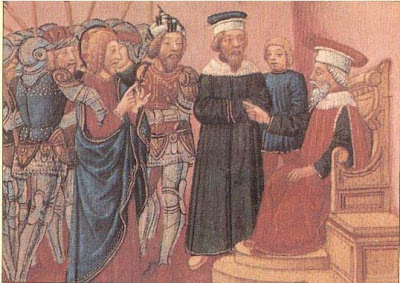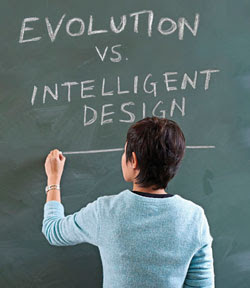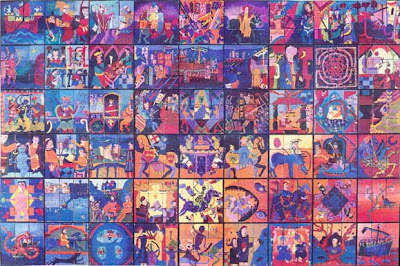 An exploration of the future
An exploration of the futureThis is my second posting on the role of religion in our present day European societies. My first posting, under the same title, can be read when you scroll downwards.
Having attempted an overview of current trends the question remains what the developments described in the first part of this essay – both the remaining role of confessional institutions in our public life and the increased presence and articulation of Muslims in our Western world – tell us about the prospects for the future in respect of the role of religion and religious institutions in our societies.
Christianity and the secular worldPerhaps, in response to this question, a first note to make is about the nature of secularization. We tend to think of secularization as a process undermining Christianity or its legacy. But we forget that in fact it is its very product. Even in our secularized world we harbor most of the values and principles which were established in the heydays of European Christendom. (1)We have largely absorbed them as the core of our humanistic values. There is no fundamental hostility between (Christian) believers and non-believers and when it comes to it we will jointly defend the entire achievement of our civilization. Christianity and European civilization have been synonyms ever since Charlemagne. The main divergence is between the dogmatic Catholic version of Christendom and our broader, protestant and secularized (and humanist) sense of it.
However, the actual dividing lines may shift over time, whether as a result of internal forces or external. The post-war decades of political and social liberation (including sexual liberation) may be seen as an example of internal pressures shifting the main divides within our societies. Today, as indicated above, we experience external challenges to some of our fundamental postulates and this may lead us to re-assert the heritage of our values and convictions and perhaps even to re-embrace Christianity as our guiding legacy in more explicit, though still primarily secularized terms. And thus we may forge new bonds between the various segments of our society which in certain periods of our history were divided, especially on the boundaries between church and state. To be clear, I am not saying that this is what necessarily should happen. I am only stating that such a prospect is more plausible at this time than has been for a long period before.
 Confusing State and Religion started here, when Jesus appeared in front of Pontius Pilatus
Confusing State and Religion started here, when Jesus appeared in front of Pontius Pilatus
State and religionAt the political level in Europe, as indicated above, Christian-democrats have all but relinquished their post-war balancing role in the wider political spectrum. I take the developments in my own country, The Netherlands, as an example. In the mid-nineties social-democrats and liberals embarked upon the much welcomed experiment of a coalition and many believed they could once and for all reduce Christian-democrats to insignificance. Ironically this was called the “Purple” coalition (red mixed with blue), a color most often associated with papal Rome. But eight years later, Christian-democrats were firmly back in their seat, not so much because of an outright failure of the purple coalition, but because of new political developments, within and especially outside The Netherlands (e.g. 9/11, the killing of a popular political leader, economic stagnation). Voters associated Christian-democrats with security, order and the kind of moderation needed to ease tensions in our agitated society. Over time, further cracks emerged in the memory of “Purple” and - rightly or wrongly – people increasingly have come to discredit its achievements.
The political realities are similar in many other (most of all northern) European countries, most notably in France, Germany and even the UK. (2)It is reflected too in the strong representation of Christian-democrats (European People’s Party) in the European Parliament, where they occupy almost 40%, the largest single segment of the seats.
 The Roman Senate was a profound exercise in secular rule
The Roman Senate was a profound exercise in secular rule Although in essence the re-assertion of Christian values is fed primarily by conservative, perhaps even defensive sentiments it would be a mistake to qualify this development as merely reactionary. I may also refer to Mueller’s observation (3)at the political level (France, UK): “Especially in the face of the financial crisis, religion has been presented as a source for what Sarkozy and German Chancellor Angela Merkel have called the project of moralizing capitalism.”
Re-assessing the role of religious institutionsAs indicated above, in the past decades the institutions of Christianity have largely been a force of moderation and social responsibility – in politics, education and other societal institutions – and they should rightly be seen as a vital, though never exclusive, factor in maintaining the overall fabric of our societies in the foreseeable future. I tend to stress this especially in the face of massive global inequities, not simply between rich and poor, but between our materialist pursuits and the actual possibilities to sustain them over the longer run.
 Let's not send him away
Let's not send him awayBut even without dramatizing this gloomy reality and most certainly without advocating the role of Christian – religious – institutions to come to our moral rescue, the prevailing challenges of our societies demand an inclusive approach. Governments would do nothing wrong in re-engaging religious institutions both at national and local levels to help ease out tensions between the various segments of society and in the process re-enforce a sense of common values. (4) What is stressed here is the potential future role of religious institutions (including Islamic institutions) as a moderating force, and not as government sponsored missionary agents.
Spirituality, religion and the public’s mindMy last main point concerns the things that are going on in people’s minds. For as much as my own education was driven by “rational observation, disciplined thought and rigid analysis” (see introduction) this is not necessarily the common denominator in our societies at large. And even the staunchest atheist can harbor a superstition or “belief”, often fueled by personal experience, which takes him close to a sense of divine providence (example: surviving an accident, or having escaped a particular accident). Those who deny that they are susceptible to this at least to some degree should be met with considerable scepticism. In short: when it comes to it, we are all human. Moreover, I believe our irrationality is what feeds our spirituality, our imagination and sense of romance – all of which are vital in the further progress of our societies. A purely scientific world would be an emotional wasteland, prone to total stagnation. In our quest for the meaning of life, of our own lives, and for ‘purpose’ we know that we have to look beyond science. In fact, I would contend that this is what drives the progress of science itself, however rational and rigid its actual process must remain. (5)
 We are all on our own road to inspiration and spiritual enlightenment
We are all on our own road to inspiration and spiritual enlightenmentIf anything, events in the past decade have proven that public sentiments can be still be stirred in unexpected magnitude, for instance when a disaster has occurred or when people wish to share their response to specific events, happy or otherwise (as has for instance become apparent after the tragic death of Princess Diana in 1997). The time is long past when religious institutions, by virtue of their community and social functions, held a monopoly in channeling such collective emotions. Mass media have firmly established a prime function in this respect, however much we may contend that they also serve to nourish false sentiments, creating a world of fake exaltation and solidarity. But none of these and similar phenomena of themselves point at the media as feeding grounds for the re-enforcement of anything in the neighborhood of common religious or moral values. (6) Most of all they appeal to the human needs of community and belonging rather than to his craving for collective myths.

Finally, and perhaps most importantly, we should be interested in the pursuits of our younger generations who are perhaps the least impressed by epic myths and legends yet spend much time dwelling in them – in their computer games, in the movies they watch and in a popular culture which offers abundant pulp fiction and staged stardom. Their most predominant pursuit, I believe, is in communicating with one another, across varied networks or platforms, exploring their individuality and that of others. It is their key process, overriding all other processes, whether at school or at home, in which they develop their own sense of life and of the world around them. Neither religion nor its denial bears any significance for them, so it seems (7). They largely live in urban environments which so obviously are the product of the human hand, so totally devoid of any remnant of divine creation, that for them the whole question of religion indeed is here nor there. They are more immune than any previous generation to institutionalized influences or indoctrination. Over time this may well constitute an entirely new level playing field for all institutions that wish to contribute to sustained social and cultural cohesion and to any common spiritual language capable of rallying the people’s minds to causes of common interest. For that matter the twenty first century could see a total obliteration of religion the way it is still in existence today as much as its rejuvenation.
On further evaluation and conclusionI have started this exploration with an open mind, simply asking myself whether religion, however defined, is here to stay and whether there is any reason to expect a renewed upsurge in religious sentiments in the future, affecting our public order . I have addressed this question out of curiosity, very much because I realize that the course of history can never be taken for granted. Out of ignorance rises enlightenment, facts, figures, reason and tolerance – and thus shall it ever be. This is not necessarily the only plausible future of our history. Nor do I contend that religion and ignorance are synonym in all respects, however critical one may be to this day about certain postulates of Christianity and other theologies. Nonetheless, the increased vocalization of religious fanaticism, not merely out of the Islamic world, inadvertently revives our attention to the very presence and impact of religion in our societies. Our key interests are progress and the improvement of the human condition in rational, factual terms. Our situation today seems more remote from that promise than ever before, both as a result of our own actions and as a result of onslaughts from outside. It is only natural that one seeks for countervailing forces. This may explain my positive attitude to religious institutions as a constructive factor in our societies.
As it stands, I nonetheless arrive at an ambiguous outcome. The greatest challenge is to look at this subject – as much as possible - in objective terms. For true objectivity indeed is extremely difficult. No doubt, my essay no doubt reflects the bias of those who wish issues relating to religion (and institutions inspired by it) had disappeared from our public life altogether.
Another difficulty in assessing the picture is the fact that most research on this topic and the majority of publications are the effort of religious institutions themselves. On the other side of the spectrum I find the people who take issue with religion as if the Reformation and subsequent secularization in our part of the world have not yet taken place. This is how I look at the eagerness of certain scientists, with Richard Dawkins as their main proponent, to claim their ultimate victory over religion on topics such as evolution versus creation. Why should we wish such a victory? I don’t see any point in bashing religions for their misguided concepts, if only they don’t bother us with them. But I do say this as the citizen of a country where the real plague of dogma has effectively been eradicated a long time ago. It has to be recognized that to this day in our part of the world the error of dogma and superstition does perpetuate itself, as Dawkins e.a. have amply demonstrated, especially through education, and there is all good reason to openly expose and counter this wherever it still occurs.
I also realize that all of the above is an essentially European outlook. Although we are united in what we call the Western world, the difference with the American outlook is astounding, more so than we care to admit. This runs through every vain of our existence – in the public domain, in our communities and even in the way we present ’science’. For instance, for a European it is appalling to see a serious and respected institution such as National Geographic treat biblical stories as if they actually happened, full swing, without reservation. Similarly it seems utterly strange to us when we see American public figures, including their President, frantically embrace God as a common truth for all Americans. Well, to a large extent, God is the common truth for Americans. (8)
For the European mind it can only be highly disconcerting that this American religious conservatism in fact determines the way in which on a global scale conflicts, especially the conflicts which largely evolve around religious issues, are handled. Indeed, there is more reason for Europeans to be a little more vigilant about the prevailing religious dogmatism in the US than about the remaining ignorance of Catholics in respect of the true age of our planet Earth and the origin of species.

In conclusion it is clear that the impact of religion and its further prospects in our world constitute a far more complex theme than could have been envisaged a few decades ago. Demographic developments and social and cultural change in our societies interplay with factors and events in the wider global scene. One could say that this is a historic constant and not a discontinuity. Present day conflicts in which ethnic and religious play an important role challenge our civilization in some of its most fundamental precepts. It is insufficient to respond to these challenges merely in defensive terms. The object is not to reconcile religions or religious traditions. Our main concern should be that whatever religious sentiments persist in our societies, they should be freely celebrated in a public order which safeguards each and everyone’s rights and responsibilities regardless these sentiments. It seems a platitude, but it isn’t. If it were, we would not have politicians, as for instance in The Netherlands, who take up battle against an entire religion, thinking that they have a cause to win, and we would have concentrated our efforts in the public sphere to securing responsible citizenship full stop, without entangling ourselves in the conundrum of integrating people’s minds and attitudes in dimensions where they should remain perfectly free to make their own choices.
---
1) For instance: Six out of the Ten Commandments constitute general moral precepts which are fully absorbed in our civil and penal codes (the other four being of purely religious nature).
2)Jan-Werner Mueller – The Return of Religion to Europe, 2009 - Project syndicate. His article can be found: www.project-syndicate.org.
3) Jan-Werner Mueller, ibid.
4) I have avoided to use the term ‘morality’ as this is a highly loaded term. But we should not deny that it is aimed at a shared morality at least to some extent.
5) Most enlightening especially in respect of present day spirituality and – the transformation of – religion is offered in “The Future of Religion” by Graham Ward, Journal of the American Academy of Religion, 74.1 (2006) 179-186.
6) Nonetheless, with the advent of Radio in the nineteen twenties, religious and ideological institutions were the first to establish an organized broadcast function of which in The Netherlands the remnants exist to this day.
7) This is a sentence I have actually copied from an observation made by Jonathan Miller in his BBC series “A Brief history of Disbelief” (2004) when he walks around in Paris in search of traces of people long dead who played an important role in challenging Christianity’s claims to moral supremacy and truth. If I had been in Miller’s place I would rather have dubbed his series “A Brief History of the Arrival at Reality”. Interestingly, on the website dedicated to this program there is a poll on the question “Do you believe in God?”. 15% of the respondents say yes, 85% say no.
8) It is interesting for those who wish to gain a better understanding for the American outlook on religion to watch the documentary “The God who wasn’t there” (2005) – wwww.watch-movies-online.tv.















